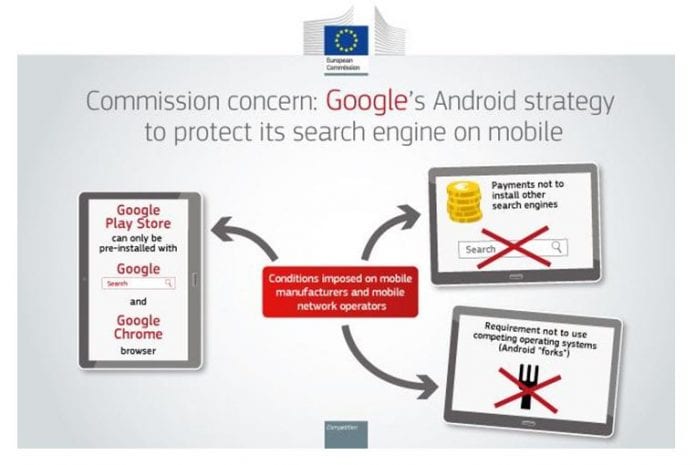Google has been charged with another antitrust case by the European Commission on Wednesday. The company is already facing charges related to promoting its shopping links at the expense of competitors, which was considered by the EU regulator as an abuse of its dominance in search.
Allegations against Google
The European Commission sent a statement of objections to Google indicating its violation of the EU antitrust rules and abused its dominant position by implementing restrictions on Android device manufacturers and mobile network operators to maintain its dominance in internet search.
The Commission alleged that the tech giant required manufacturers to pre-install Google Search and Chrome browser on their devices. The company also required them to set Google Search as default search service on their devices, a condition to license certain Google proprietary app.
The Commission also accused the tech giant of preventing manufacturers from selling smart devices powered by competing operating systems based on the Android open source code.
The company allegedly provides financial incentives to manufacturers and mobile network operators if they agree to pre-install Google Search on their devices exclusively.
According to the regulator, the practice appeared to block competing search engines to access the market and harm consumers by stifling competition and restricting innovation in the broader mobile space.
In a statement, Commissioner Margrethe Vestager, chief of competition policy, said, “A competitive mobile internet sector is increasingly important for consumers and businesses in Europe. Based on our investigation thus far, we believe that Google’s behavior denies consumers a wider choice of mobile apps and services and stands in the way of innovation by other players, in breach of EU antitrust rules.”
According to her, the search engine giant has the opportunity to respond to the concerns raised by the Commission.
Google’s response
In a blog post, Kent Walker, senior vice president and general counsel at Google, said, “We take these concerns seriously, but we also believe that our business model keeps manufacturer’s costs low and their flexibility high, while giving consumers unprecedented control of their mobile devices.”
According to Walker, the company’s partner agreements are entirely voluntary. Manufacturers can download the operating system for free and they can also modify it to build a phone.
Manufacturers who participate in the Android ecosystem commit to test and certify that their devices will support Android apps. The apps wouldn’t work from one Android device to the next without the system.
Manufacturer has the option to load the suite of Google apps and free to add other apps on their devices.
Walker also emphasized that manufacturers use Android for free. However, it is costly to develop, improve, keep the operating system secure and defend against patent suits. Google offset its costs through the revenue generated from Google apps and services distributed through Android.
Additionally, Walker emphasized that users can personalize and download various apps (including direct competitors) on their devices easily.
“The popularity of apps like Spotify, WhatsApp, Angry Birds, Instagram, Snapchat and many more show how easy it is for consumers to use new apps they like. Over 50 billion apps have been downloaded on Android,” said Walker.









